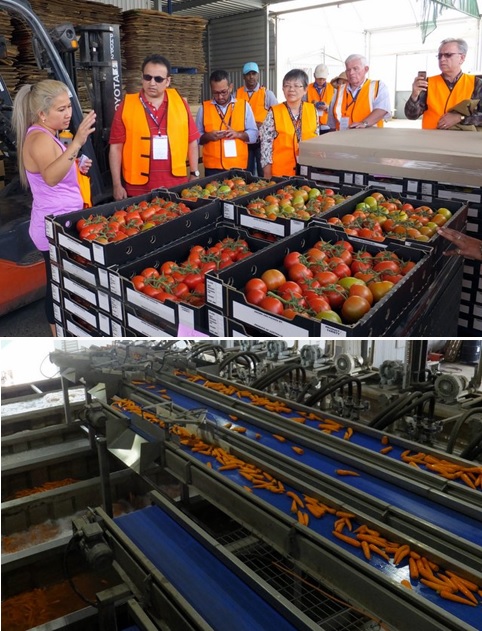
Select Page
A group of 22 agriculture delegates from the APO are in South Australia for the first time this week to learn from the state’s innovative agricultural practices and understand more about its agricultural sector. They are learning about the latest innovations and best practices in agriculture.

APO delegates taking a tour of the H&L Hydroponics Pt. Ltd. facility as part of the study mission in South Australia to understand the best practices and innovations that can be replicated and applied to increase productivity and profitability of the agriculture sector in their respective countries.
The delegates from 12 Asia-Pacific countries are attending the APO Study Mission to a Non-member Country on Innovations in Agriculture to Increase Productivity and Profitability held in Adelaide, Australia, 7–12 November 2016. The study mission is hosted by the Government of South Australia and Primary Industries & Regions SA (PIRSA). The program includes visits to farms, food distribution centers, processors, wholesalers, and research centers, taking in the Adelaide metropolitan area, Adelaide Hills, Virginia, Northern Adelaide Plains, and McLaren Vale. The group will learn about the sustainability of South Australia’s agribusinesses and how to keep produce fresh while maintaining quality throughout the whole supply chain, from growing and processing to packaging and distribution.
Expressing his happiness over the format of the study mission, APO Secretary-General Dr. Santhi Kanoktanaporn pointed out that it would provide member countries a rare opportunity to visit several organizations, institutions, farms, and companies and observe state-of-the-art operations in the agriculture sector. “The delegates will also have the opportunity to learn about the latest trends, methods, and technologies for postharvest handling of agricultural and food products,” he said.
The study mission aims not only to showcase how South Australian agricultural producers increase productivity and profitability but also raise awareness of the region’s premium food and wine products. Extending a warm welcome to all APO delegates, PIRSA Deputy Chief Executive Professor Mehdi Doroudi expressed the hope that they would enjoy learning about the innovative techniques and best practices used.
It is important to note that the agriculture sector is facing the enormous challenge of feeding about 10 billion people by 2050. To meet that requirement, it is imperative for world food production to increase by 70%, despite the limited availability of arable land and fresh water and other less predictable factors, such as the impact of climate change.
Experts believe that innovation-led, productivity-driven agricultural growth is critical in enabling developing member countries to enhance national and regional food security. In most developing countries in Asia and the Pacific, however, the agricultural landscape is dominated by small- and medium-sized farms, where productivity and profitability remain low and degradation of natural resources is widespread. The main constraint is a lack of knowledge of advanced production technologies, postharvest management, and modern farm management tools and techniques.
The APO study mission to South Australia aims at bridging this knowledge gap and facilitating the transfer of knowledge through experiential learning since the country is acknowledged for its fresh produce and food products and has been in the forefront of global quality ratings for decades. Direct extension activities including the introduction of new techniques, technologies, and ideas and training of growers and producers have made the agriculture sector a pillar of the Australian economy despite droughts, water restrictions, and uncertain weather conditions.
South Australia also has a global reputation for producing some of the highest-quality food and wine. Wine grapes are grown in clean soil, seafood comes from clean oceans, and agricultural produce is generated in a pristine environment. It is the leading agricultural state, producing a wide range of fruit and vegetables on small-, medium- and large-sized farms.
“The study mission will provide delegates with an opportunity to understand how they can improve productivity and profitability, increasing produce yields from a small area while using limited resources and energy,” Ross noted, adding that delegates would have the opportunity to network with farmers, food producers, and agriculture and research professionals, which might lead to future knowledge and information sharing to benefit the industry.